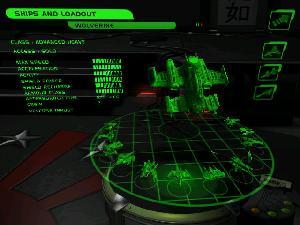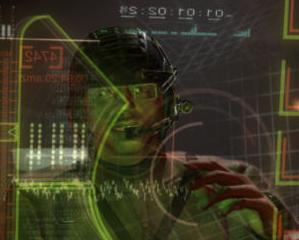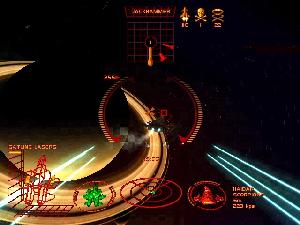Life, Death, and Wing Commander.
Ideological crusades are hard to come by. The few examples in the 20th century,
which only count if you believe in slightly incomplete views of history, were
WWII and the Cold War. Us vs. Them, Good vs. Bad – at least if you can overlook
the complexities. Then again, you can always forget the real world and turn
to cinema. Just drive down Star Wars lane to find epic conflict worthy
of the bravest heroes and most scurrilous villains.
So it’s no mystery that space combat games cast you into highly polarized
struggles as the one man (Luke Skywalker, Christopher Blair, the ubiquitous
‘Pilot’) who can turn the tide of the conflict and save humanity. Great stuff.
At Origin Systems, a group of developers pioneered the space combat genre
with the Wing Commander games. A few years ago, those designers (most
notably the Roberts brothers, Chris and Erin) left Origin to found Digital Anvil.
After being involved in the unfortunate Wing Commander movie, Digital
Anvil’s first game is a new space combat sim, set exclusively in our own solar
system and resembling WWII with NATO/Russian opponents.
Needless to say, StarLancer is by no means an original idea. It is,
however, the space combat genre polished to a shine and delivered with a seamless
formula, resulting in one of the best times anyone is likely to have in silicon
outer space.
The year is 2160. The long conflict between the Eastern Coalition (Russians,
bad guys) and the Western Alliance (NATO) is about to end with the signing of
a treaty on Europa. Hopes for peace are dashed, however, when the Coalition
turns back-stabber and launches a massive, ‘Pearl Harbor’ style attack on the
Alliance that leaves our fair western forces on the losing side and in need
of anyone who can fly to take up arms and fight for freedom.
Naturally, this is where you come in. You are a new recruit, placed into the rookie 45th Volunteer squadron. Your task is to prove yourself and your squad, and help win the war.
StarLancer departs from the interactive-movie model of the later Wing
Commander games by creating an experience as rich in gameplay and fun as
atmosphere and narrative. The game puts you through a campaign in which nothing
is expected and your actions have palpable effects on your future. Eschewing
the traditional branching mission tree, StarLancer modifies missions
based on past performance. Fail to take out that carrier and it might show up
at just the wrong time in your next sortie, while your squadmates chastise you
for your poor performance.
In the cockpit, things feel… perfect. Handling and movement in StarLancer
is the amalgamation of every good idea on the subject of space combat flight
in gaming that anyone has ever had. You spin, role, even strafe and powerslide
with utter smoothness. The handling, combined with a focus on guns that limits
the success of standoff missile tactics, results in combat that is heavy hitting,
intense, up-close, and utterly satisfying.
Enemy AI is good enough, and although individual ships die fairly easy, this
never feels like an arcade game, just more kinetic than Freespace
2 or X-Wing
Alliance. Along with well defined, varied handling characteristics for each
ship, you have combat depth and intensity that is unrivaled anywhere in fighter-based
space combat gaming.
 StarLancer
StarLancer
uses an original graphics engine to create a strikingly visceral outer space
conflict. Thanks to expert design, modeling, texturing and lighting, StarLancer
feels real. The ship you are tailing feels tangible, almost touchable.
Weapons and special effects are intelligently restrained (while still appealing,
you should see things explode), never outshining the ships themselves and therefore
keeping a balance that maintains a constant graphical verisimilitude.
The cinematics are sublime. The same team that did the special effects for
the Wing Commander movie rendered all the CG footage for StarLancer
(and slipped a little WC footage into one of the news broadcast movies,
probably as an inside joke), and their work is at the top of the industry.
Backing this up is some excellent audio. Voice acting throughout is good,
helping to define the characters. Since you never actually talk to them on your
carrier and have to get to know them through mid-mission communications, this
is critical. Audio effects and 3D sound are also done well.
Multiplayer gaming has an interesting twist. In addition to a variety of deathmatch
modes, several gamers can play cooperatively through the single player game.
All players who began the game can save their progress and continue playing
by themselves in single player. Alternatively, they can use the saved game to
host another multi-player game if they need some help getting past a particularly
tough mission. The blurring of the dividing line between single-player and multi-player
is intriguing and something which hopefully will be emulated in the future.
There are a few problems, though. Status is never quite as clearly detailed
as it is in the Freespace games and sometimes things can become confusing,
such as when you have to protect an escape pod you can’t even really see. The
lack of situiational awareness can get frustrating. A more detailed HUD would
have been helpful.
Also, at only about 22 missions, StarLancer is a trifle short. Plus,
it really is just refined, streamlined Wing Commander; an old friend
to be sure, but you know the score. While Digital Anvil certainly created a
good game, it lacks the extra ‘oomph’ we all expected.
Aside from that, there is little not to like about StarLancer. It’s
a near-perfect traditional space combat game. I’m one of the most discriminating
space combat fans out there, and StarLancer was just a joy to review.
Go ahead, show the evil empire who really knows their way around a joystick.

-
Excellent space combat action
-
Cool graphics
-
Good sound
-
Neat multiplayer twist
-
Still pretty much Wing Commander
-
Still pretty much Wing Commander
-
A little too short
-
Not enough innovation







